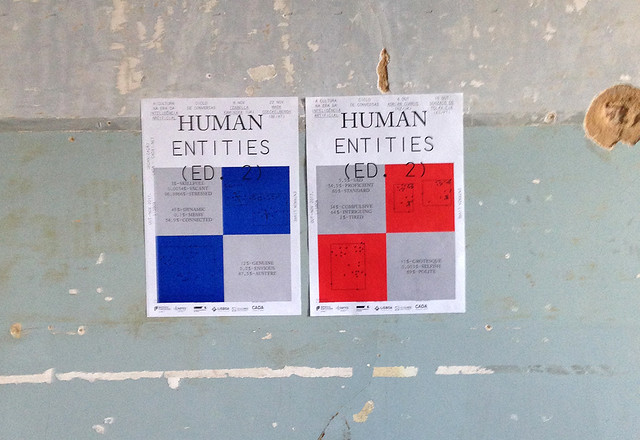
[English below]
Human Entities 2017: a cultura na era da inteligência artificial
Quarta, 8 novembro, 2017, 18.30 – 20.30
Entrada livre mediante registo
Quando é que a inovação não é realmente inovadora?
Izabella Kaminska (UK)
FT Alphaville, Financial Times, Londres
Existe uma presunção na tecnolandia de que toda a inovação é boa, e que mais informação e data só podem produzir resultados positivos. Mas, e se a inovação puder ser boa e má? Por exemplo, os criminosos são altamente inovadores, mas acrescentam realmente algum valor? Da mesma forma, informação pode ser precisa ou enganosa. A estatística pode ser grandemente mal usada para confirmar preconceitos ao invés de estabelecer conclusões neutras.
E enquanto a nossa mentalidade cultural se aproxima cada vez mais da aceitação de grupos diversos, estão a ser introduzidos algoritmos e redes neurais que não possuem este tipo de empatia e acabam por discriminar desapaixonadamente. Em corporações de todo o mundo, num claro exemplo do paradoxo de Jevons em acção, administradores e pessoal crucial estão a ser dispensados ou reduzidos apenas para serem substituídos por grupos de consultores de TIC ainda mais caros (e muitas vezes de maior dimensão). Na maioria dos casos com muito pouco impacto nos resultados. A ideia que Robert Solow avançou nos anos 90, de que podemos ver a era do computador em todo o lado excepto nas estatísticas de produtividade, ainda não se dissipou como resultado.
Numa era onde a Google pode despedir um trabalhador por este acreditar que as mulheres podem ser naturalmente inclinadas para várias profissões, mas o seu próprio algoritmo manifesta constantemente imensos pressupostos sobre as tendências e inclinações das mulheres, enquanto ao mesmo tempo estimula a criação de vantagens que derivam de conhecimentos prévios sobre os consumidores na internet, temos que nos interrogar sobre que interesses está Silicon Valley realmente a servir? A tecnologia que não capacita as massas dificilmente é libertadora ou progressiva.
Nesta apresentação, Izabella Kaminska aborda algumas das maiores falácias veiculadas pela comunidade tecnológica e estimula a audiência a questionar a lógica subjacente a alguma da retórica que é ‘impingida’ às massas sobre os sistemas tecnológicos.
Izabella Kaminska
Izabella Kaminska é escritora, blogger e colunista para o Financial Times onde escreve para o premiado blog FT Alphaville e para as suas secções de opinião. Escreve regularmente sobre tecnologia, media e tendências de mercado, assim como economia, banca e finança. Nos últimos anos desviou a sua atenção para a ascensão da fintech, da economia da partilha e da cryptocurrency. Antes de se juntar ao FT, Izabella foi produtora para a CNBC e repórter para a Reuters. Iniciou a sua carreira a trabalhar para empresas de língua inglesa na antiga União Soviética, enquanto desenvolveu conhecimento especializado sobre a indústria petroquímica. Também trabalhou como editora associada da revista interna da BP.
Links:
https://ftalphaville.ft.com/author/Izabella Kaminska
@izakaminska
A conversa com Izabella será seguida de uma Q&A moderada por Sandro Mendonça (Professor, ISCTE Business School e colunista do jornal Expresso)
Local: Trienal de Arquitectura de Lisboa, Campo de Santa Clara, 142-145, 1100-474, Lisboa
Data: Quarta, 8 novembro, 2017, 18.30 – 20.30
Este evento está integrado no ciclo
Human Entities 2017: a cultura na era da inteligência artificial
Ciclo de conversas outubro – novembro 2017
Organização CADA em parceria com a Trienal de Arquitectura de Lisboa
ENGLISH
Human Entities 2017: culture in the age of artificial intelligence
Talk 3
Wed 8 Nov 2017, 18.30 – 20.30
Free entry, registration required
When is innovation not really innovation?
Izabella Kaminska (UK)
FT Alphaville, Financial Times, London
There’s a presumption in technologyland that all innovation is good, and that more information and more data can only lead to positive outcomes. But what if innovation can be both good and bad? For example, criminals are highly innovative, but are they really adding value? Information too can be both accurate or misleading. Statistics can be grossly misused to confirm biases rather than set out neutral findings.
And whereas our cultural mindset is moving towards greater acceptance of diverse groups, algorithms and neural networks are being introduced which lack this sort of empathy entirely and end up discriminating in-passionately. At corporations around the world, in a clear example of Jevons paradox in action, administrators and core staff are being laid off or downsized only to be replaced with even more expensive (and often larger) cohorts of IT consultants in the long run. Most of the time there’s very little impact on the bottom line.
The proposition Robert Solow’s put forward in the 90s that we can see the computer age everywhere but in the productivity statistics is simply not dissipating as a result.
In an era when Google can fire an employee for believing that women may be naturally inclined towards different professions, yet its own algorithms make huge presumptions about the tendencies and inclinations of women all the time, while encouraging gaming and front-running of consumers on the internet, we have to ask just whose interests is Silicon Valley really serving? Technology that fails to empower the masses is hardly liberating or progressive.
In this presentation, Izabella Kaminska will address some of the major technological fallacies being propagated by the tech community and ask the audience to question the logic behind some of the rhetoric being force fed to the masses with regards to technological systems.
Izabella Kaminska
Izabella Kaminska is a writer, blogger and columnist for the Financial Times‘s award-winning FT Alphaville blog as well as for its opinion
pages. She regularly reports about technology, media and market trends, as well as economics, banking and finance. In the last few
years she’s turned her attention to the rise of fintech, the sharing economy and cryptocurrency. Before joining the FT, Izabella was a producer for CNBC and a reporter for Reuters. She started her career working for English-language business titles in the former Soviet Union, while developing specialist knowledge about the petrochemical industry. She has also worked as an associate editor of BP’s internal magazine.
Links:
https://ftalphaville.ft.com/author/Izabella Kaminska
@izakaminska
Izabella’s talk will be followed by a Q&A session moderated by Sandro Mendonça (Professor, ISCTE Business School and columnist at Expresso newspaper)
Venue: Lisbon Architecture Triennale, Campo Santa Clara 142-145, 1100-474 Lisbon, Portugal
Date: Wed 8 Nov 2017, 18.30 – 20.30
This event is part of
Human Entities 2017: culture in the age of artificial intelligence
Public talks October – November 2017
Read more about the programme
Organização CADA em parceria com a Trienal de Arquitectura de Lisboa | Organised by CADA in partnership with the Lisbon Architecture Triennale
![]()

Estrutura financiada por: | Funded by:

Apoio: | Supported by:


Design: Marco Balesteros (Letra); Foto: | Photo: Rosie Hallam


